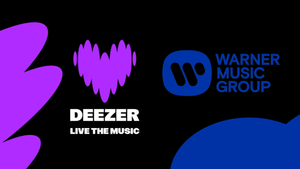It’s been confirmed that Warner Music is participating in Deezer’s French pilot of the “artist-centric” model for paying streaming royalties.
The President of Warner Music France, Alain Veille, discussed the pilot in an interview with Les Echoes yesterday, stating that the major is fully committed to working with the streaming services on developing new business models that “better reflect the value and fan engagement driven by artists and songwriters”.
Deezer’s “artist-centric” model - cleverly conceived without talking to any actual artists - is a response to calls by the major record companies for streaming services to change the way they allocate revenue to each track each month.
The changes mean that - rather than all plays of all tracks from all artists being treated equally for track allocation purposes - certain plays, tracks and artists get preferential treatment.
Under Deezer’s new model, functional audio like white noise and bird song isn’t allocated any money. Meanwhile each play of a track made by a ‘professional artist’ is counted twice, as is any play where a user actively picks a track, rather than it being pushed to them by an algorithm.
Although it was Universal Music boss Lucian Grainge who first publicly called for changes to be made to the track allocation processes employed by the streaming services, Warner Music chief Robert Kyncl subsequently also spoke about the need to reform the model. This means it’s no surprise that the mini major is also participating in the Deezer pilot.
Indeed Veille added that Warner is “delighted” to support a new model that “rewards engaging music and demonetises non-artist noise”.
Having unveiled its Universal-backed artist-centric model in September, Deezer has been busy trying to persuade all of its other licensing partners on the recordings side to sign up for the pilot, which is happening in France, its home and biggest market.
Spotify, meanwhile, is plotting its own revamp to its track allocation process, addressing the same concerns but with an alternative approach. Among other things, it will introduce an annual threshold that each track will need to pass to be allocated any money at all.

